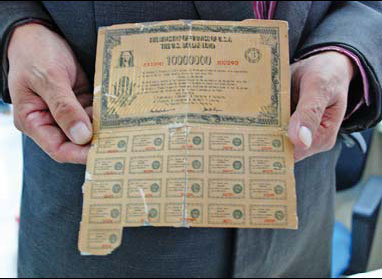Ex-worker asks to cash 10 million US bond
Updated: 2011-11-08 08:07
By Wu Yong and Xie Chuanjiao (China Daily)
|
|||||||||
BEIJING / QINGDAO - A retired factory worker has vowed to continue seeking help to cash a $10-million US Treasury bond despite being told that the document is an obvious fake.
 |
|
Zhang, a 62-year-old villager from Weifang, East China's Shandong province, holds what he claims is a $10-million US Treasury bond that has been in his family since the 1930s. [Photo / China Daily] |
The 62-year-old, who asked to be identified only as Zhang, has repeated in media interviews that the bond has been in his family since the 1930s.
However, when China Daily compared photographs of the bond with examples of counterfeits published on the US Treasury website, it was discovered they are virtually identical including an element that shows Zhang's bond was likely printed as late as the 1980s.
The villager, who survives on a monthly pension of just 1,500 yuan ($240), showed no outward signs of shock when China Daily reporters broke the news to him last week.
"This is a conspiracy by the United States government," he said from his suburban home in Weifang, East China's Shandong province. "I know they (the US) won't want to admit this so I will go to Beijing to seek help from television (media) and scholars."
Zhang says he was given the bond in 1998 by his father. According to the story he was told, his grandfather, a wealthy coal baron, purchased it 70 years ago. "One of my grandfather's friends, who ran a private bank in Shanghai, warned him of the danger of severe depreciation," Zhang said. His grandfather died in 1943.
"The dollar bond may be counterfeit but I still don't think my father and grandfather cheated me," he added firmly.
After catching the attention of the Chinese media, Zhang has spent the last few weeks soliciting help from the corporate world. He said several local companies have been in touch, although he is yet to receive a firm offer of assistance.
"I want to cooperate with someone who can help me," he said. "I was planning to trade this (the US Treasury bond) in for some money so I can live a better life, and then donate the rest to the country."
Whatever millionaire fantasy Zhang still holds, the reality is that he is not likely to receive a penny from the US Treasury.
"We've had many inquiries recently concerning these (bonds). This is not a legal security," said a spokeswoman for Washington's public debt department in an e-mail.
Compared with examples published on the US Treasury website of the six most common counterfeits, Zhang's "$10-million bond" features elements that are consistent with at least two of them.
As well as having a bogus serial number starting "2022" and graphics cut and pasted from US dollar notes, the document Zhang says his grandfather purchased in the 1930s appears to carry the signature of Donald Regan, who served as secretary to the US Treasury between 1981 and 1985.
According to a BBC report, police in the United States and Philippines seized more than $2 trillion in fake US Federal Reserve bonds in the southern Philippines in 2001. It is believed the notes may have been part of a "lost treasure" scam, where buyers are told the documents have just been found.
Wu Binbin in Qingdao contributed to this story.











